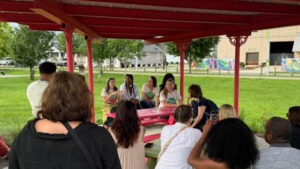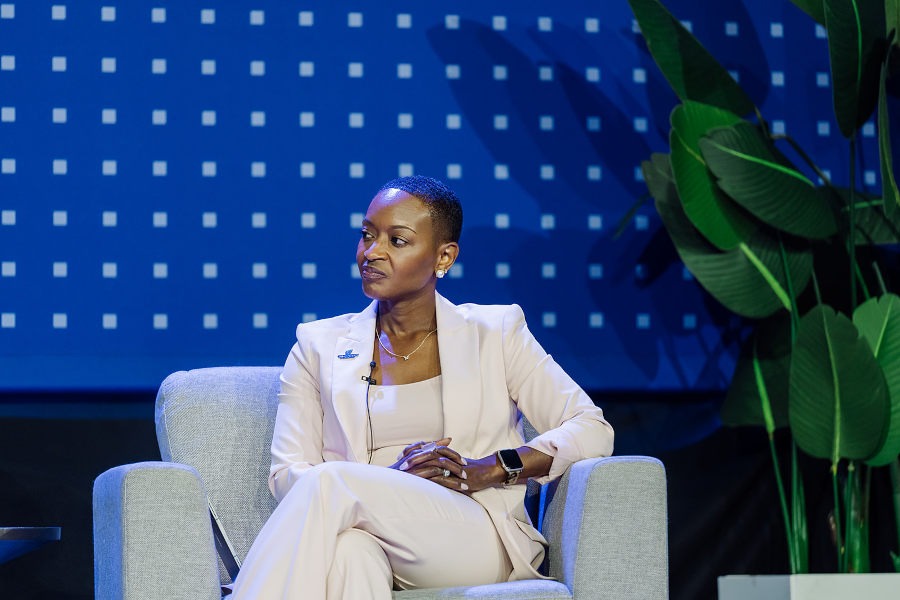
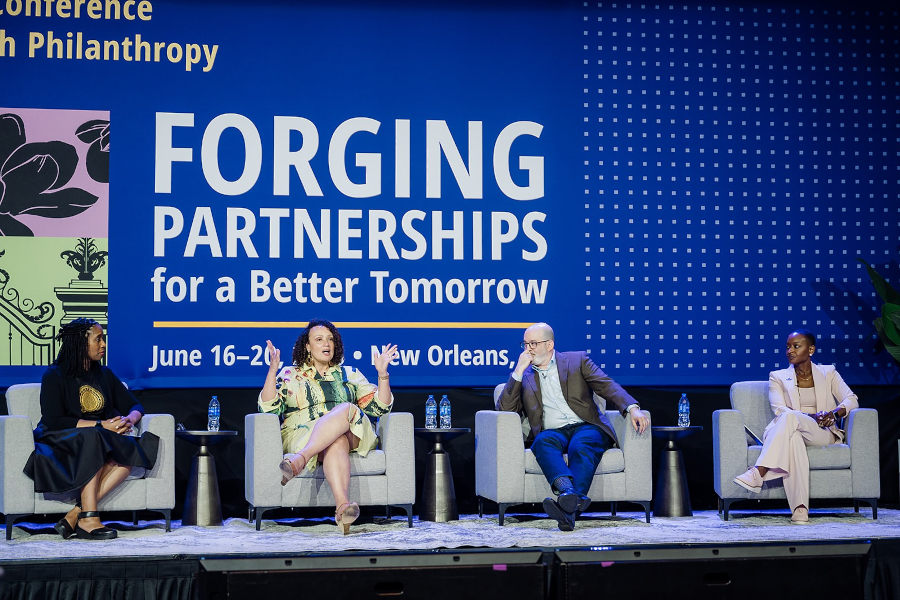
“We are weathered, but not weakened.”
– Qiana Thomason, President and CEO, Health Forward Foundation and Board Chair, Grantmakers In Health
Today, over 840 funders and thought leaders, representing 440 organizations, gathered in New Orleans for the largest Annual Conference on Health Philanthropy ever. Conference attendees started the day with site visits around the Crescent City and newcomer and networking lunches, rooting the week ahead in connections with the New Orleans community and each other.
The Opening Plenary, Learning Labs, and Quick Takes touched on the challenges health funders face while also amplifying the new and innovative ways philanthropy can partner to strengthen the health landscape and navigate the road ahead. Connection is always embedded in the conference, but this year in particular, attendees are encouraged to seek out new voices and co-create a vision for giving.
Opening Plenary: The Freedom to Give
As Cara James, President and CEO of Grantmakers In Health, stepped on stage for the Opening Plenary, minds were occupied by the state of the country. Dr. James opened the first official day of the GIH Annual Conference on Health Philanthropy in New Orleans with an acknowledgment: this moment is heavy. Every day, we are inundated with news about harmful policies, concerning workforce reductions, and devastating funding cuts. There has been a relentless disinvestment in a future that many in the room worked so hard to build.
Programs that protect the health of millions of Americans have been dismantled, science is being dismissed, and years of federal civil service and knowledge have been destroyed. These changes will not make people healthier, and as health funders have long known, the impacts will fall mainly on the most vulnerable.
However, philanthropy is uniquely positioned to support communities at this time, and Dr. James is inspired by how philanthropy has moved quickly to help increase funding and resources, as well as uplift voices and co-create solutions. Social improvement comes from systemic transformation, and that is what philanthropy is equipped to do in this moment.
But this is just the start. The path forward requires courageous action and a shared vision for the future with partners across all sectors of society. It will require all of us to ensure the future works for everyone, not a select few.
While the news might be bleak, Dr. James noted that there is hope at this conference—a hope centered on moving beyond business as usual. “Partner with purpose. Speak truth to power. Build a future in which all of our descendants have the opportunity to lead a healthy and productive life.”
Following the opening remarks, Tonya Allen, President of the McKnight Foundation, Joe Goldman, President of the Democracy Fund, and Qiana Thomason, President and CEO of the Health Forward Foundation and GIH Board Chair, joined Dr. James onstage to discuss the current political environment, its implications for health and philanthropy, and how funders can continue working towards better health for all in these circumstances.
Allen shared that the recent political trauma that her community experienced in Minnesota indicates that philanthropy must be ready to respond, hold the line, and stand in the gap. She shared that the philanthropic community will be called on in ways that they have never been called on before. It is not just the freedom to give that funders must maintain, but the freedom to speak, assemble, and dissent. To do this, philanthropy cannot show up with old tools. “Whatever they’re expecting us to do, do the opposite.”
Goldman agreed that this is the moment to think outside the box. As someone focused on the health of American democracy, he firmly believes that to achieve a healthy democracy, the field must look sector-wide. That’s why Goldman came to Grantmakers In Health: he knows that this is the time to move beyond silos and courageously step up for each other, for grantees, and for communities.
Thomason drove home the critical importance of communities in this work. The Health Forward Foundation has a fundamental belief in the power and promise of communities. She acknowledged that the community health infrastructure they have worked for years to build is being tested. But “out of all the sectors, [philanthropy] has the least to lose. The only thing that I believe we have to lose is our own self-imposed chains.” For Thomason, that means committing to civic engagement, organizing and coalition-building, and building a foundation, from Board members to grantees, that is committed to health, joy, and courage.
Throughout the discussion, panelists shared key actions funders can take now to think and give differently:
- Paint a clearer picture of what we, as a country, deserve. Help people understand what we’re working towards and how we’ll get there.
- Intentionally advance movements.
- Uphold your institutional values.
- Make decisions rooted in courage, not fear.
- Build a safety infrastructure for grantees.
- Be as proximate as possible to the community. Convene, listen, and then move out of the way.
- Consider the wellness needs of partners. Do more to ensure rest, restoration, and wellness.
- Remember that elections are always around the corner. By investing early, funders can ensure that elections remain free and fair.
Before wrapping the powerful opening plenary, Dr. James asked panelists for one takeaway to guide the work moving forward:
Thomason shared a Martin Luther King Jr. quote that drives her: “Power without love is reckless and abusive. Love without power is sentimental and anemic. Justice at its best is power checking everything that stands against love.” To be a virtuous force, philanthropy must combine the love of mankind with the power of community.
Goldman shared that every time he has wondered whether philanthropy can withstand increasing pressures, he is moved by how funders have stepped up in recent months. Philanthropy will fold if funders operate individually. It is only when the field comes together and demonstrates bravery that we will succeed.
Allen ended with a succinct but guiding message: “We’re more than enough.”
A Warm Welcome On- and Off-Site
The conference formally kicked off with a series of site visits to see health efforts in action around New Orleans. Conference attendees explored several programs working to advance a healthier city, including the New Orleans Health Department’s newly established universal postpartum home visiting program and the Louisiana Small-Scale Agriculture Coalition’s programs helping new growers sell fresh products locally. Some attendees also explored the past and present of the French Quarter on a tour focused on the forms of resistance used by enslaved people during the French, Spanish, and American colonial periods.
The site visits covered a wide range of topics, but one truth is clear: exploring the past and present equips us for a healthier future, both here in New Orleans and across the United States. As Shelina Davis, CEO of the Louisiana Public Health Institute at Building a Shared Future by Addressing Health, Climate, and Gender Disparities put it, “Although New Orleans is a city rooted in its past, it is also the future. We are a model of how climate change impacts communities; it is hitting us first. We are teaching other communities around the world about how to respond to disasters.”
Onsite, attendees at the Newcomers’ Lunch shared an eagerness to learn, grow, and forge new partnerships in the days ahead. Qiana Thomas, Board Chair of Grantmakers In Health and President and CEO of the Health Forward Foundation, welcomed first-time conference attendees to the 2025 GIH Annual Conference on Health Philanthropy and encouraged everyone to collaborate and share ideas over the next few days. Dr. Cara V. James, PhD, President and CEO of Grantmakers in Health, acknowledged the large number of newcomers at this year’s conference, and echoed Qiana’s call to make connections and be in community this week.
Jill Schumann, VP of Programs at Grantmakers in Health, provided a foundation for GIH’s mission, vision, and approach. Among other highlights she shared, Jill noted that GIH is one of the oldest and largest philanthropy-serving organizations, and acts as the connective tissue for the field of health philanthropy. Jill also outlined the focus areas and pillars of the GIH strategic plan, which covers a wide array of health issues, and she encouraged attendees to identify how their work is reflected in GIH’s priorities throughout the conference.
Learning Lab: Advocating for Aging Adults in Uncertain Times
Amid uncertainty in the advocacy space for older adults, panelists led with clarity, focus, and direction.
Showing a commitment to centering the voices of those they advocate for, the panel started with a video from The People Say, a catalog of older adults’ personal experiences navigating healthcare access, caregiving support, and other critical issues. Vivian Nava-Schellinger, Director of Community Impact & California Partnerships at The SCAN Foundation, shared that older adults are the experts of their own lives, and older adult-advocacy must be informed by their perspectives and personal experiences.
After hearing from several older adults in the video about their challenges accessing Medicaid, transportation, job opportunities, and more, the panel unpacked the intersecting inequities fueling these challenges. Alison Barkof, Hirsh Health Law & Policy Associate Professor and Program Director at The George Washington University, Milken Institute of Public Health, emphasized the disproportionate and far-reaching impact of Medicaid cuts on older adults. Kezia Scales, Vice President of Research and Evaluation at PHI National, built upon Alison’s points with a focus on direct care workers, whose wages, benefits, and opportunities for professional growth are dependent upon Medicaid funding.
Importantly, moderator Jonathan Cohen, Director of Policy Engagement at University of Southern California, shifted the panel and attendees into thinking through solutions. Among others, panelists elevated:
- Investing in:
- Research and data that help advocates make their case for more equitable policies.
- Cross-sector collaboratives and projects.
- Development of the direct care workforce.
- Local initiatives with the potential to make an impact on the national stage.
- Collaborating with funders in other sectors, because no one issue exists in a silo.
- Ensuring funders’ decisions are informed by the expertise of older adults. In other words, ensure conversations about funding decisions include those whose lives will be impacted by said decisions.
True to the conference theme, attendees were encouraged to continue their conversations about older adult advocacy and connect with the many individuals and organizations already immersed in this work, including those represented on the panel.
Steady Voices in Unsteady Times: Strategies for Communicating in Crisis
When Jeff Barrus, Director of Communications at Grantmakers In Health, asked, “What organizations are experiencing unprecedented communications challenges?,” the room quickly filled with raised hands. Organizations and thought leaders are struggling with what, when, and how to communicate. In this session, speakers shared new research and messaging on how to best communicate about health equity, especially in moments of crisis and uncertainty, followed by dynamic and interactive small group sessions.
Over the past few months, millions of dollars have been invested in shaping the public narrative around health equity, and organizations are being asked to respond. But, as demonstrated by the simple question posed at the start of the session, many funders may not be equipped to communicate effectively. For organizations of all sizes, staying grounded in core values, and using science-based, plain language are great ways to reinforce the most important issues with key audiences.
Beth Tritter, Partner – Social Impact at FGS Global and Chrystal Okonta, Director – Health at FGS Global shared clear frameworks and strategies for communications, including principles for preparing and planning for crisis communications:
- Be consistent: Speak with one voice.
- Keep it simple: Ensure your statements stick to confirmed facts.
- Prioritize: Not every aspect of a crisis requires a response.
- Be timely and accurate.
- Stay on your front foot: Whenever possible, ensure the key audiences hear news from you directly.
- Be coordinated across your organization and the field.
- Accept that “perception is reality”: Be forthcoming, honest, empathetic, and proactive.
- Anticipate what’s next.
Additionally, Okonta shared the new Quick-Start Guide for Funders: Crisis Preparedness and Response on the Fly, which includes guidance on what to do before and during a crisis. With this guidance in mind, each table formed a crisis responses working group to develop a response strategy and communications materials for key internal and external audiences. Teams discussed the crisis scenario’s biggest vulnerabilities, how to respond credibly to it, the objective, and more.
Grantmakers In Health and FGS Global have developed new communications tools and templates to help Funding Partners keep health equity at the center of their philanthropy and their values at the center of their communications. Stay tuned for a key message platform and crisis and issues management playbook, and join GIH’s communications learning community where members can ask tough questions and engage in timely discussions.
Community Partnerships for Joyous Reproductive Experiences for Black Birthing People
Show up differently. Tshema Nash, DrPH, MPH, Access to Care Program Officer at the Community Benefit Giving, Cedars-Sinai, continued the thread from today’s Opening Plenary by sharing how Cedars-Sinai’s Black Birth Equity Initiative helped Cedars-Sinai stretch and reimagine its grantmaking. With negative Black maternal health outcomes on the rise, the Initiative looked to fund across the continuum, from individual to systems, to support better birth outcomes. Since 2020, they have supported 25 grantees working to improve prenatal and postpartum outcomes financially and as a connector and convener. As a connector, the Initiative ensures each grantee knows the other organizations’ goals and objectives. Nash scans the field for grant opportunities and asks grantees to share communications challenges, upcoming events, and resources to create biweekly communication with the group. The Initiative also recently convened grantees for a day of community and knowledge-building to identify solutions, and included people key to internal birth equity work at Cedars-Sinai.
Kimberly Gray, Director of Perinatal Mental Health at Maternal Mental Health NOW, emphasized how vital the Initiative’s role as a connector and convener has been to Maternal Mental Health NOW’s Black birthworker community. The partnership between funder and grantee allows for open dialogue, sustains and nourishes the work, and creates critical connections to collectively advance better birth outcomes. Since 2022, Maternal Mental Health NOW has responded to the birthworker community, building a network, a library of resources, and creating opportunities to engage. Gray noted that central to their work is the belief that care for the caregiver leads to positive birth outcomes. Through their work with the Initiative, they have centered joy, connection, celebration, community, sustainability, and learning for the 300+ birthworkers.
Both Nash and Gray underscored that strong partnerships have led to successful outcomes for the Initiative and Maternal Mental Health NOW and for birth workers and pregnant people overall.
Power-Sharing Partnerships to Improve Health Care Access
The Bristol Myers Squibb Foundation is committed to improving global health by strengthening health systems and supporting their capacity. The foundation invests in innovative, groundbreaking projects worldwide. While its presence is felt globally, the Bristol Myers Squibb Foundation is based in New Jersey and wanted to find a new way to invest where its roots are.
Ornesha Watson, Associate Director of the Bristol Myers Squibb Foundation, explained the foundation’s big idea: a place-based grant focused on safety net providers. The investment would support grant partners’ capacity, autonomy, and long-term sustainability. But a problem emerged: without a deeper understanding of New Jersey, the foundation was uncertain where, or how, to begin. Ornesha and her team recognized the need to find a strategic partner: a team with the place-based knowledge to refine the idea, collaborate on the framework, manage communications, and provide technical assistance to grantees.
Enter the Camden Coalition. Based in Camden, New Jersey, this care management program for individuals with complex health and social needs was the ideal partner for what the Bristol Myers Squibb Foundation proposed. Sheryl Mathis, Director of Technical Assistance at the Camden Coalition, shared that the two organizations swiftly found ways to share power as co-developers of the program and combine their strengths.
Working in close collaboration ultimately led to a program tailored to its audience and well-received by grantees. 18 months into the first cohort of what is now called the New Jersey Safety Net Innovation Program (NJSNIP), grantees reported feeling trusted, supported, and understood as members of the program.
Opening Reception
After a full day of learning, connecting, and growing, hundreds of attendees gathered to talk about the day and immerse themselves further in the culture of New Orleans. Attendees enjoyed treats synonymous with the city, including Louisiana rice and various types of gumbo, and a soundtrack of lively jazz, blues, and soul music. Looking across the room, the conference theme was clear: people were already forging new partnerships. Let’s continue to build on these foundational conversations and nourishing moments in the days ahead.
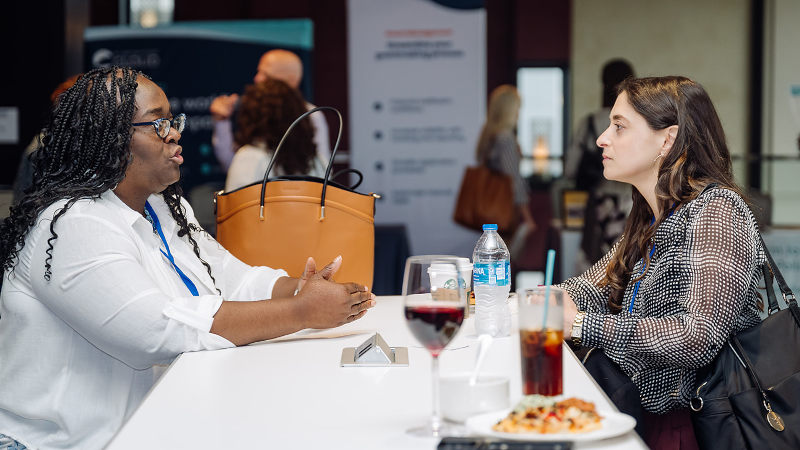
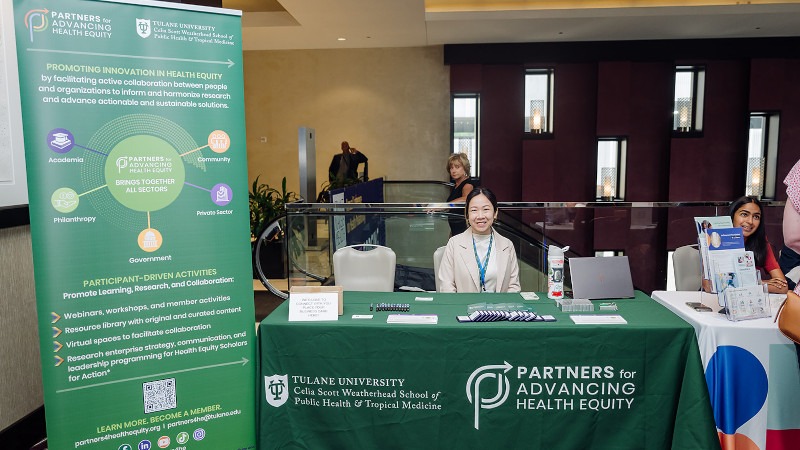
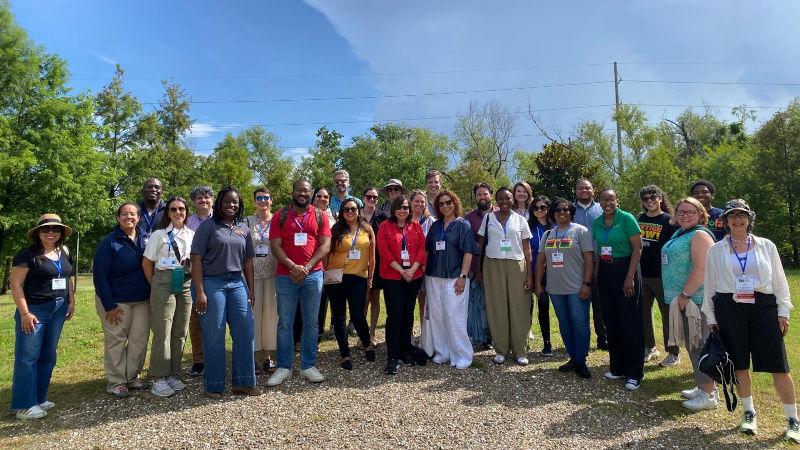
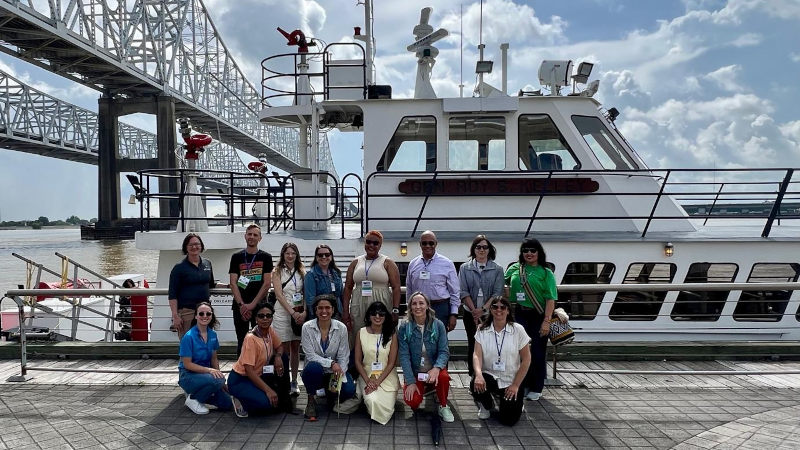
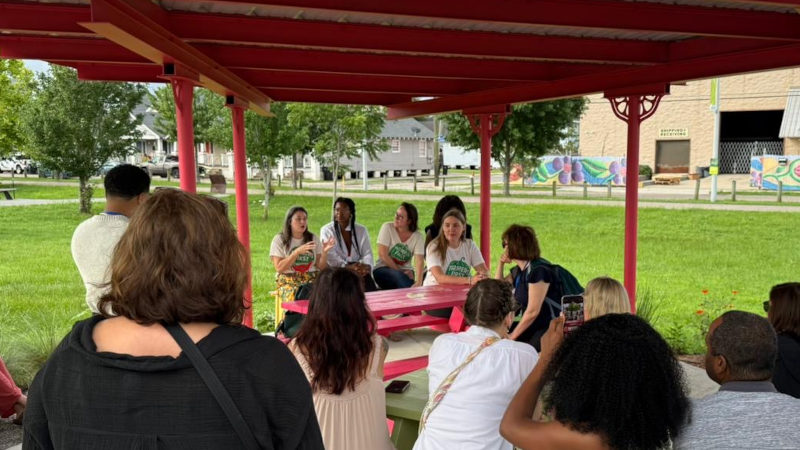
NOLA Facts: Levi Spear Parmly, a leader in oral health and dental hygiene, is credited with inventing dental floss in New Orleans in 1815.
Follow all the conference activities on GIH socials and the official GIH Annual Conference app.
Facebook | LinkedIn | Instagram | Conference App

